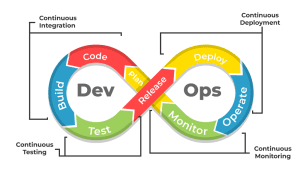The Power of DevOps: Revolutionizing Software Development
Are you tired of waiting for weeks or even months to release new software features? Is your development team struggling with communication gaps and inefficient processes? If so, it’s time to embrace the power of DevOps. In this article, we will explore how DevOps can revolutionize the way software is developed, deployed, and maintained. By the end, you’ll understand how this approach can enhance collaboration, streamline workflows, and ultimately drive business success.
What is DevOps and Why Does it Matter?
DevOps, a combination of “development” and “operations,” is a software development approach that promotes close collaboration between development and operations teams. It aims to break down the silos between these traditionally separate departments and foster a culture of shared responsibility.
In the traditional waterfall development model, developers would work on new features or bug fixes for an extended period, only handing over their code to the operations team when it was considered “ready.” This handoff often led to misunderstandings and delays, as the operations team attempted to understand and deploy the code without prior involvement.
DevOps, on the other hand, emphasizes continuous integration and continuous delivery (CI/CD). Developers and operations teams work together from the beginning of a project, exchanging feedback and aligning objectives. This collaborative approach ensures that software is developed with deployment in mind, reducing the time between iterations and accelerating time-to-market.
The Benefits of Implementing DevOps
- Faster Time-to-Market: By breaking down the barriers between development and operations, DevOps enables rapid feature delivery. Changes can be deployed quickly and efficiently, allowing businesses to respond to market demands and customer feedback promptly.
- Improved Collaboration: DevOps promotes a culture of collaboration, ensuring that developers and operations teams work hand in hand throughout the software development lifecycle. This collaboration leads to shorter feedback cycles, faster bug fixes, and more reliable software.
- Enhanced Quality and Stability: With DevOps, developers can catch bugs and address issues early in the development process. Frequent testing and integration help identify and resolve issues before they compound, resulting in more stable and reliable software.
- Increased Efficiency: DevOps automates manual processes, reducing the likelihood of human errors and minimizing repetitive tasks. By leveraging infrastructure-as-code and deployment automation, businesses can scale their operations more efficiently and focus on delivering value rather than firefighting.
- Boosted Innovation: DevOps creates an environment that encourages experimentation and risk-taking. By promoting a fail-fast, fail-forward mentality, businesses can innovate at a faster pace and explore new opportunities without the fear of major setbacks.

Overcoming Challenges in Adopting DevOps
While the benefits of DevOps are undeniable, organizations often face challenges during its implementation. Some common hurdles include:
- Cultural Resistance: Introducing DevOps requires a cultural shift within the organization. Silos may need to be broken down, and individuals must be open to collaboration and shared responsibility.
- Tooling and Automation: Successful DevOps implementation relies on the right tools and automation frameworks. Ensuring seamless integration and compatibility across different technologies can be a complex task.
- Legacy Infrastructure: Organizations with legacy systems may face difficulties in integrating them into a DevOps environment. However, with the right approach, it is possible to gradually modernize the infrastructure and adopt DevOps practices.
- Skills Gap: Adopting DevOps often necessitates upskilling or reskilling team members. Investing in training and continuous learning is crucial to overcome the skills gap and ensure a successful transition.
Conclusion: Embrace the Power of DevOps
In today’s fast-paced and competitive market, adopting DevOps is no longer a luxury but a necessity. Its ability to bring together development and operations teams, streamline workflows, and foster a culture of collaboration makes it a game-changer for software development.
By embracing DevOps, businesses can unlock the potential for faster time-to-market, improved quality, increased efficiency, and greater innovation. Overcoming the challenges may require investment in training, tooling, and cultural transformation, but the rewards are worth the effort.
So, ask yourself, are you ready to harness the power of DevOps and propel your business forward? Adopting DevOps is not just a trend; it is a strategic move that can empower your team and drive success in the ever-evolving software development landscape.




